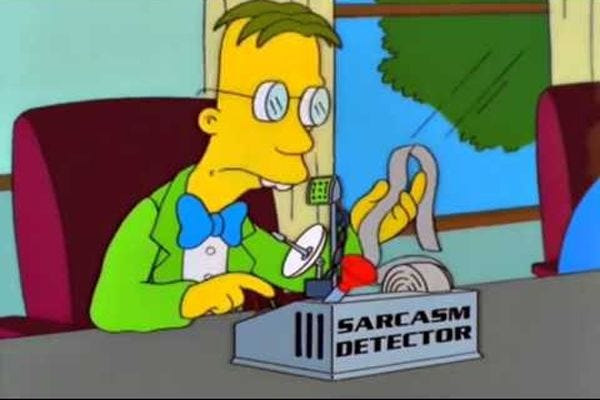Study Finds Sarcasm Is Good For You. Yeah, Right.
I don't understand. It beeps whenever I type 'A Idiot'
Excellent news, everyone! A new study has determined that reading Wonkette will add years to your life, help you lose weight, make you smarter, and guarantee you more access to sex. Or snark. Maybe it was snark. Also, the rest of that was kind of a lie, too, except possibly the making you smarter part. What the research actually suggests is that sarcasm can, in some circumstances, boost your ability to think creatively, which may not add years to your life but certainly can't hurt.
As Yr Wonkette has noted before, it's flattering to think a facility with sarcasm indicates braininess, because being in on a joke means you're at least clever enough to know the surface meaning of a statement isn't its real meaning. And as a previous study suggested, there may also be a connection between sarcasm and empathy -- to get sarcasm, you have to be able to relate clearly enough to the other person to understand their sarcastic intentions. Yes, really.
In the new study, Harvard Business School behavioral scientist Francesca Gino reports on research she and her colleagues conducted to test some of the ancillary effects of sarcasm. She starts with the commonsense observation that business and marital communications often advise people to avoid sarcasm, since its effects are often perceived to be cutting and cruel. This remains good advice in situations where there might be tension, for instance between couples in relationship counseling, which might explain why the marriage counselors advise against sarcasm, no?
Gino acknowledges the scornful intent of much sarcasm: "Thanks for putting in all that effort on your report" isn't necessarily praise if the report is full of typos. In fact, she cites a study in which sarcastic statements were seen as more harshly critical than open, direct criticism. For instance, telling a smoker "I see you don’t have a healthy concern for your lungs" was perceived as milder criticism than "I see you have a healthy concern for your lungs." (Gino didn't comment, however, on the example itself. The "literal" statement sounds weirdly stilted, while the sarcastic statement sounds like something someone might actually say.)
There's also this problem: compared to "normal" communication, sarcasm is more likely to be misinterpreted, especially in written form, absent the audio and visual cues of oral communication (duh, eyeroll). In an interesting quirk, students in one study often mislabeled sarcastic or literal intent in email messages even though they'd been told in advance some statements would be straightforward and some would be sarcastic. This helps explain why, once in a while, a Wonkette comment (which we do not allow) will say "I sure hope that last line was a joke" when the last line is something like "Trump campaign insiders told Wonkette they are considering having the candidate kick an orphan off the stage just to see how far his supporters' tolerance for terrible behavior can be pushed. They dropped the idea when a focus group of Trump voters demanded he kick the orphan harder."
Which brings us to Gino's own research. We'll let her explain the methodology herself:
In one study, we assigned some participants to engage in either simulated sarcastic, sincere, or neutral dialogues by choosing from pre-written responses on a sheet of paper. Others were recipients of these different types of messages from others. Immediately after participants engaged in these “conversations,” we presented them with tasks testing their creativity. Not surprisingly, the participants exposed to sarcasm reported more interpersonal conflict than those in other groups. More interestingly, those who engaged in a sarcastic conversation fared better on creativity tasks. The processes involved in initiating and delivering a sarcastic comment improved the creativity and cognitive functioning of both the commenter and the recipient. This creativity effect only emerged when recipients picked up on the sarcasm behind the expresser’s message rather than taking mean comments at face value.
So why the increased creativity? Gino thinks it's the result of the brain having to work a little harder to unravel the puzzle of a sarcastic statement, priming it for greater creativity:
To either create or understand sarcasm, tone must overcome the contradiction between the literal and actual meanings of the sarcastic expressions. This is a process that activates, and is facilitated by, abstraction, which in turn promotes creative thinking.
We buy that, though of course we have a vested professional interest in the matter. Gino's group also noted:
given the same content and tone, sarcasm expressed toward or received from someone we trust is less conflict provoking than sarcasm expressed toward or received from someone we distrust. Of course, if we were to vary the tone and content, it would make a difference too – given an extremely harsh tone and critical content, even trust might not be enough.
Oh, hey, look, we're back at that empathy thing again! (And as Yr Editrix kept reminding us the other time we wrote about sarcasm, it's about the mirror neurons, stupid). Sarcasm from a friend is of course more tolerable than sarcasm from a stranger, and far more welcome than sarcasm from an antagonist, which is why Wonkette readers ate it up when Sara Benincasa called you a bunch of "stinking, filthy fuckaducks," and also why you will go buy six copies of her book in the hope she will taunt you a second time. Or possibly because you're a bunch of masochistic weirdos.
And we mean that in the nicest possible way, because we love you.
[ Scientific American via Salon ]




Do it for that frenemy in your pants.
What about "Semper Fidelis???!!!"